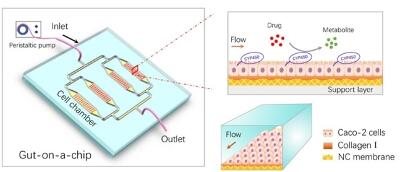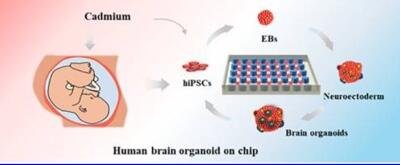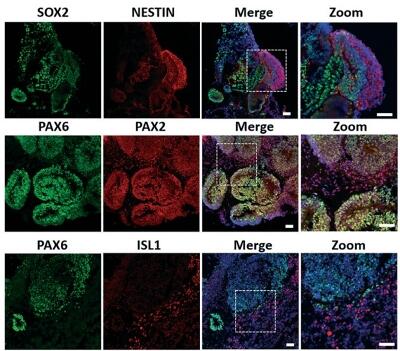A Biomimetic Human Gut-on-a-Chip for Modeling Drug Metabolism in Intestine |
We made the first attempt to develop a biomimetic human gut- on-a-chip for modeling drug metabolism in intestine. In this chip, constant flow, together with porous nitrocellulose membrane and collagen I, mimics an in vivo-like intestinal microenvironment. This biomimetic human gut-on-a-chip promoted the differentiation of intestinal cells with enhanced functionality by creating a biomimetic 3D microenvironment in vitro. It might offer a bioactive, low-cost, and flexible in vitro platform for studies on intestinal metabolism as well as preclinical drug development. |

|
|
Artificial Organs, 2018, DOI:10.1111/aor.13163 |
Engineering brain organoids to probe impaired neurogenesis induced by cadmium |
We proposed a simple approach to engineer brain organoids on an array chip with octagon-shaped micropillars and explored neural dysfunctions of brain organoids under Cd exposure. hiPSC-derived brain organoids with millimeter-size recapitulated spatial and temporal patterning events in the early developing brain, including gene expression programs and three-dimensional organization. This work provides a simple manner to generate brain organoids efficiently and a powerful platform for the investigation of abnormal neurogenesis induced by many different toxic factors in vitro. |

|
|
ACS Biomaterials Science & Engineering, 2018, 4(5),1908-1915. |
Human brain organoid-on-a-chip to model prenatal nicotine exposure |
we create a new brain organoid-on-a-chip system derived from human induced pluripotent stem cells (hiPSCs) that allows us to model neurodevelopmental disorders under prenatal nicotine exposure (PNE) at early stages. The brain organoid-on-a-chip system facilitates 3D culture, in situ neural differentiation, and self-organization of brain organoids under continuous perfused cultures in a controlled manner. The generated brain organoids displayed well-defined neural differentiation, regionalization, and cortical organization, which recapitulates the key features of the early stages of human brain development. testing. |

|
|
Lab on a Chip, 2018, 18(6),851-860 (Cover image) |

 Research Interests
>
正文
Research Interests
>
正文